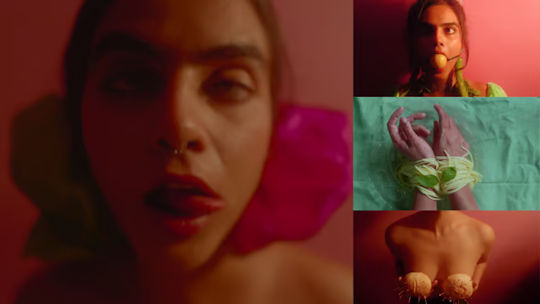Source: Homegrown.co.in
INDIA – The pomegranate is indubitably the favourite fruit in art history. A treasury of symbolism that vibrates power, passion, it has been used as a metaphor for femininity, death, desire and even cannibalism as a form of romance – to offer oneself (literally) for the sustenance of your beloved. Some have also called it the perfect fruit for horror. Throughout history food is employed in art, literature & film as reliable allegories for the human body, life & mortality. Through visual and textual surrealism, this parallel between the two has inconspicuously expanded our understanding of existence and our place in the world.

Drawing upon the same visceral connection, ‘Edibles’ is a triptych that intersects two very similar instincts of humanity: hunger and desire. The photo series by artist duo Rhea and Mayank was produced under the mentorship of Apurva Kulkarni and presented at his second series of online workshop titled ‘Everyday Objects Shriek Aloud’. Designed to honour surrealism’s centenary, Edibles transforms ordinary items into provocative symbols.

“Too often, the one thing that impedes true creativity is yourself. ‘Everyday Objects Shriek Aloud’ is an online workshop that helps you to get out of your way. Based on methods and techniques of Surrealism it allows you to gain direct access to your unconscious – a direct hotline as it were. This results in deliciously unhinged artwork!”, shares Apurva, founder of Altamirra.
Apurva, founder of Altamirra
In the series, the artists take everyday food items like lemons, herbs, and pasta and give them a surreal twist. The buns with colourful ball-head pins, resembling breasts, the lemon as a ball gag and the pasta-basil shibari on the wrists are all a witty nod to bondage. The images are presented in the layout of a menu/recipe book that further emphasizes the metaphor.
Edibles also ventures into the post-feminist realm by reimagining the male gaze through a female lens with Rhea, the artist, bringing the concept to life and dissolving the divide that defines and distinguishes them. By blurring these lines, the series disrupts conventional feminist ideals, making space for a shared experience that defies rigid gender constructs and reclaims visual representation of the female gaze vis-à-vis free thought as a playground for inclusivity and unity.
“The creative choice to pair food and the body taps into the intimate connection we have with consumption and identity. Food, a basic need, here becomes more than sustenance—it is reimagined as an extension of the self, a form of expression, and even a symbol of desire or repulsion. Through this interplay, we intend to blur boundaries, transforming these elements into evocative metaphors.”
Rhea
Stimulating our senses of taste and touch, Edibles creates a strong visual and conceptual narrative that’s positively pregnant with interpretations. It twists and folds the idea of pleasure upon itself and sculpts a cryptic and sensorial experience that speaks to the subconscious mind; something that forms the pillar of the surrealist movement. Buns, Pasta and Chutney, a combination as absurd as the images themselves, works in layers and becomes a delightful fusion of food and sexuality.
Follow Rhea here and Mayank here.
If you enjoyed reading this, here’s more from Homegrown:
Ramsi Krishna’s Warhole-Like Self-Portraits Capture The Introspective Angst Of Adulthood
Homegrown Photographers Tell Us About A Picture That Changed The Way They See The World
Aashna Singh And Farheen Fatima’s New Photobook Examines The Hidden Cost Of Housework

